- Home
- Darrell Maloney
The Final Chapter Page 12
The Final Chapter Read online
Page 12
“But they won’t come out of the projects because some fools have been filling their heads with wild rumors.
“They’re saying those who leave the projects are being rounded up and killed, or captured and placed into concentration camps.
“And because they’re in a vulnerable state, they’re taking the rumors to heart. They’re afraid to come out and they’ll starve to death if we don’t convince them it’s safe.”
“Is it dangerous?”
“I hope not. But I’d be dishonest if I didn’t tell you it could be.”
“You’d better not be dishonest with me, young man. I’ll slap your hand, friend or no friend.”
Again, she tempered her harsh words with a smile.
John couldn’t help but be cowed anyway.
“Yes ma’am.”
“How long do you expect we’ll be in there? If I spend too much time away from here people start getting lazy.”
“I don’t know. Long enough to identify the people who appear to be in charge. And then to talk to them and try to enlist their help.
“Maybe a couple of hours.
“But I certainly don’t expect you to go yourself.”
“Nonsense. I’ll not ask my sisters to go into a potentially dangerous situation unless I’m willing to go myself. You were in the military, John. You understand a leader’s role is to lead, not to point their fingers.”
“Yes ma’am.”
“Have you checked with Father John?”
“No ma’am. I wanted to talk to you first.”
“Good. I’ll have an easier time convincing him than you’d have. Give me an hour to get his blessing and to find Sister Krista.
“We’ll meet you back here then.”
-37-
Going into the VC with a contingent of strong women was, it turned out, a very smart move.
Victoria Courts had a very bad reputation prior to the power outage.
In the daytime it looked like any other low-cost government housing development.
At night, it was said, it turned into a war zone.
The Bloods owned everything west of Labor Street; the Crips everything east, except for a small area north of Devine Street.
That was where MS-13 had established a foothold in a bloody turf war the year before the lights went out.
They were looking to expand their turf south of Devine, but the blackout put everything on hold.
There was nothing, it was said, that was devine about Devine Street.
Victoria Courts before the blackout was one of those places even the police didn’t like to go at night. For they were lured in on a regular basis just to be used for target practice.
But even the baddest of men won’t fire on a nun.
Most men won’t fire on a woman at all, unless she poses a direct threat to them.
One of the last vestiges of decency among most, but not all gang bangers, is a respect for older women.
Perhaps it’s because they see in those older women their own mothers.
It’s funny, not in a humorous way but rather in an ironic one. A hard-core gang banger who thinks nothing of severely beating his wife or girlfriend will go out of his way to protect old people and children.
It’s one of the more paradoxical truths of the gangster lifestyle.
Female police officers always get more respect in the hood than male officers.
Perhaps that’s because life in the hood is never easy, not even from the beginning.
People who live in the projects have to be tough to survive. They have to claw their way up from an early age and fight for what’s theirs.
Perhaps they understand a woman in any profession, especially a male-dominated profession like policing, has to fight just as hard to prove herself.
Or maybe it’s because a female officer brings out the softer side of hardened thugs.
Whatever the case, Officers Luna and Sharp were nervous but not scared.
They had the confidence they’d be safe. That they could talk their way out of most situations, and resort to their duty weapons if called upon.
Of course, these weren’t normal times.
There was a sense the people in the projects were like cornered animals.
They felt trapped in the hood with no safe place to go.
And everyone knows cornered animals can snap in less than a heartbeat.
Jessica Luna was a social worker who dealt with these people on a daily basis for seven years.
Then she got bored with filling out disability and medical care requests and listening to women complain for the thousandth time how their husbands beat them, and excuses for why they wouldn’t leave them.
She thought she could accomplish more by becoming a police officer and applied to the academy.
Her first post was as a beat officer on the east side of San Antonio, in a housing project called Goliad Courts.
The residents termed it “the jungle.”
At Goliad Luna encountered many of the people she’d served as a social worker. They remembered her and showed her a respect male officers who’d never gotten to know them could only dream of getting.
She went to the VC on a routine transfer a year later and saw even more people she remembered.
She never lost the traits which made her a good advocate for the people. It showed in her police work and she was popular in the hood.
She wasn’t quite one of “them,” but there was the sense she was on their side.
Officer Sharp, on the other hand, was one of “them” in every sense of the word.
She’d come to the VC as a baby. She grew up there.
She defied the odds by finishing high school in a neighborhood where most kids didn’t.
She clawed her way through college too, getting a degree in criminal justice.
They remembered her in Victoria Courts.
More importantly, they still liked her.
They saw her as just and fair.
A few remembered John.
Not quite as fondly as they did Sharp.
But he had a good reputation as well as a fair officer.
One who wouldn’t beat or taze them or shoot first and sort everything out later.
All in all, it was a good contingent of emissaries they brought into the hood that afternoon.
John personally thought they had a reasonable chance of success.
They drove down Labor Street into the heart of the project, to a park at the corner of Labor and Refugio.
From the park they could see and be seen from all three turfs.
And indeed, the Crips, Bloods and MS-13 all had wary eyes on them.
Sharp remembered the park as being neutral grounds for all gangs.
All three gangs used it, though they clustered among themselves in small bunches and didn’t mingle.
It was the gathering place for everybody in the VC.
A place where everyone could go to cook out, or play cards or dominoes, or play football or basketball.
A place where they could enjoy not each other’s company, but at least one another’s space without fear of bloodshed.
It was by unwritten rule that anyone entering the park abide by an uneasy truce. They’d not bring anger to their neighbors and would expect no anger to be brought to them.
It was the logical place for John and his bunch to make their pitch.
-38-
They came in convoy, driving three marked SAPD cruisers.
That was Rhett’s idea, talking John into parking his Kerr County pickup truck and switching to a local squad car.
“Nobody goes into the VC looking vulnerable and expects to walk out again.
“Taking three cars instead of one will send a discrete message you’re capable of coming in force.
“And that more force is available quickly if you need it.”
They parked in line along Labor Street and grouped up before walking into the park.
Two young men recognized Officer
Sharp and greeted her warmly.
“Wassup, girl! How come you never come around here anymore?”
“Well, you know. I’m busy locking up gang bangers like you guys. How come you’re outta jail, anyway?”
It was meant in humor, and was taken that way.
The streets have a banter all their own, which may seem rude or harsh to an outsider.
But in the hood, offense is never taken as long as certain subjects are off limits.
Like mothers and girlfriends and the legal system.
“Who runs the three corners these days?” Sharp asked, referring to the gang leaders.
“Oh, you know. Tay Tay still runs the Crips. Big Boi is king of the Bloods. Some dude named Suarez is MS-13.”
“Are any of them here?”
The young man looked around, scanning the park for familiar faces.
“That’s Big Boi over there at that picnic table with his security guys.
“Over there is Tay Tay. On the courts. He’s the one with no shirt and the bandana.
“I don’t see Suarez.”
“Tell me about Suarez.”
“Don’t know much. He don’t tramp on our turf, we don’t tramp on his.
“Rumor is he’s a pretty good guy in that he’s stable.”
“Meaning what?”
“He don’t pull no surprises. Word is if he’s coming at you he tells you so up front so it’s a fair fight. He don’t ambush you or go after your old lady like some gangsters do.
“Word is it’s a Mexican thing that goes way back. No Mexican wants to be accused of fighting dirty. It’s a pride thing, I guess. They’d rather get killed than get a bad reputation.
“So as long as you don’t cross him you got no worries.”
“And if you do cross him?”
“Word is if you cross him nobody ever sees you again. Either cuz you get the hell out of town or because he cuts you into little pieces and uses you for firewood.”
“You know where we can find him?”
“Nope. But I know who does know.”
“Who’s that?”
“Just look around you, honey. There’s black and brown men all over the place.
“The brown ones belong to Suarez.
“I expect any one of them can tell you where Suarez is at.”
She smiled at him broadly, then signaled with her index finger for him to draw closer.
He recognized the gesture as one little boys and little girls used on the playground when they were ready to whisper secrets.
He smiled and drew closer to her.
She whispered into his ear, “Thank you for your help. If you ever call me honey again I’ll cut your balls off and hand them to you.”
He drew back, horrified.
“Dayummmm!”
She smiled, but he got the sense she wasn’t kidding.
He turned and walked away, his cohort right behind him.
Sharp and Luna strode in lock step toward the center of the park, headed toward a pair of shirtless and heavily-tattooed Latinos.
They were lifting weights at a free weight site in the blazing sun, as far away from a shade tree as they could get.
Behind Sharp and Luna were Sister Mary Beth and Sister Krista.
John brought up the rear.
As any backup security man would.
Scarlett stayed by his side, intimidated enough to keep her mouth closed.
John was along as an observer and to help out at the first sign of trouble. Although this was his idea, he had no authority in San Antonio, for he no longer lived there.
He’d let the SAPD officers run the show unless and until he was needed.
Officer Sharp knew one of the Hispanic men, but not well.
“You look familiar to me. Have I arrested you before?”
The man laughed, but not in a sarcastic or hateful way.
“That’s the worst pickup line I ever heard. But okay, mamacita. I’ll go out with you.”
“Not in your wildest dream, even if that dream came on your birthday, mijo. Seriously, have I arrested you?”
“No. You came close when you caught me with a little weed. But you gave me a break and let me loose with a warning.”
“Good. You owe me a favor then. I need to speak to Suarez. Can you send a runner after him?”
“You gonna arrest him? If you arrest him he won’t be too nice to me for sending for him.”
“No. I’m here to talk. I have no reason to arrest him.”
He studied her face for a moment.
“You know, I believe you. You got a good rep as a straight shooter around here.”
“I’ve worked hard for that rep. I’m not gonna blow it by lying to you.”
The man let out a whistle and a Hispanic boy of fifteen or sixteen came running.
“Go get el jefe. Tell him Officer Sharp wants to speak to him.”
-39-
“Thank you Rudy,” Officer Sharp said as the boy ran off.
“Ah, you do remember me,” the man answered with a grin.
“How could I forget such a handsome mug?”
It wasn’t a concession as much as it was an acknowledgement.
An acknowledgement that while Sharp represented a symbol of authority and had to come off as tough, she could project a human side at the same time.
After all, she herself was a product of these same projects.
The current residents were, in a sense, her people.
“I’ll be over there, talking to the Crips. How will I know when Mr. Suarez is here?”
“I’ll whistle to get your attention and then wave.”
“Good enough. Thanks again.”
“You’re welcome.”
The team walked to a complex of three full-sized basketball courts.
Only one was currently in use, and only half of it.
A rough and tumble game of three on three was in progress.
Six sweaty men were battling it out.
And everything came to a halt when the officers and their entourage got close.
Officer Sharp called out “Ball!” and held out her hands.
The man holding the basketball dutifully complied.
Sharp dribbled the ball once, twice, three times, and then let off a beautiful floater from just outside the three point line.
It sailed through the rim without touching the sides.
Nothing but net.
Or, in this case, nothing but chain.
The shot elicited a couple of catcalls.
And a lot of respect.
“Not bad,” a shirtless man noted.
Sharp replied, “I grew up here. I used to own this court. In fact, the last time I played I went five and oh. I guess that means I still own it.”
“You’re welcome to come back anytime and defend it. I’ve got some girls who can make it hard for you to hang onto.”
“We haven’t met. I’m Angela Sharp. And you, I’m guessing, are Tay Tay.”
“I am. But how did you know?”
“Only the gang leader would invite me back without having to check with the boss.”
“What can I do for you, Officer Angela Sharp?”
“I want to talk to you about rumors.”
“Rumors? Sure thing. I got some real juicy ones. In fact, some of them involve you and me.”
She let the implication slide.
“Specifically, rumors that anyone who leaves the hood will be killed by the police or put into prison camps.”
He backed up a step and raised both hands in front of him.
“Hey, hey, hey, I don’t spread them kind of rumors.”
“But you’ve heard them.”
“Hell, everybody’s heard them.”
“Do you believe them?”
“I don’t know what to believe. All I know is what I see with my own two eyes.
“And what I see with my own two eyes is that cats who walk out of here almost never come back. Now you tell me, if they ain’t get
tin’ killed, and they ain’t gettin’ captured, then what in hell is happenin’ to them?”
“What’s happening to them is they’re finding better living arrangements on the outside.”
“What kind of better living arrangements?”
“For one thing, the city is giving them a house. A real house. A house they get to choose.
“A house they don’t have to pay subsidized rent for. In fact, it’s totally free.”
Tay Tay said, rather snarkily, “Hell, nobody’s paid rent around here in years.”
“That’s true. But that’s only because the housing office hasn’t been around to collect it. That doesn’t mean it isn’t owed.”
“And you say the city is giving people free houses?
“How? And why?”
“Eighty percent of the city didn’t survive or left for greener pastures.
“All that property is abandoned and has been seized by the city.
“Now they don’t know what to do with it. They can’t maintain it, and they don’t want it to fall into disrepair and become a blight on the community…”
“Whoa, whoa, whoa. What’s a blight?”
“An eyesore. They don’t want them to become crack houses or fire traps.”
“Now that’s language I can understand. So they’re just giving them away, with no strings attached?”
“The only strings attached are there’s a limit of one house per adult resident, and they must reside in it and make repairs to it as needed.”
Tay Tay rubbed his chin, as though deep in thought.
Officer Sharp went on, “There are also city programs to help feed the people.
The Catholic Services offers a free meal every day at the Alamo to anyone who shows up.
“I knew about that. I been there a time or two my own self.”
“There’s more though. Anyone who wants can get a plot of land in one of the parks so they can grow their own garden. The city will teach them how. They can keep whatever they grow and eat it or barter it for other things.”
“Sounds easier just to go to the Alamo every day and eat for free.”
“That would be your choice.”
“Why should I believe you?”
“You can ask around, for one thing. Your people know me. I grew up in the VC. I’m one of you.”
“If you was a Crip I believe I’d know about it.”

 A Perilous Journey
A Perilous Journey The Yellowstone Event: Book 6: The Aftermath
The Yellowstone Event: Book 6: The Aftermath Eden Bound
Eden Bound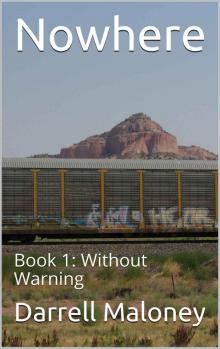 Without Warning
Without Warning Everything Has Changed
Everything Has Changed Rest in Peace
Rest in Peace This Changes Everything
This Changes Everything The Final Chapter
The Final Chapter It Can't Be Her
It Can't Be Her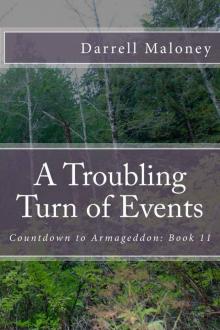 A Troubling Turn of Events
A Troubling Turn of Events The Blockade
The Blockade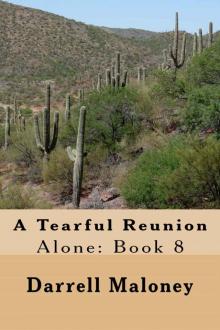 A Tearful Reunion
A Tearful Reunion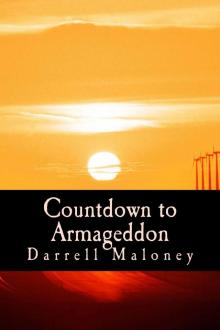 Countdown to Armageddon
Countdown to Armageddon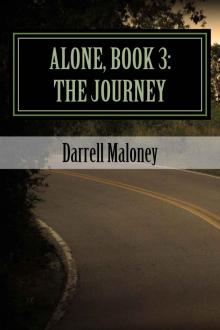 Alone, Book 3: The Journey
Alone, Book 3: The Journey The Army Comes Calling
The Army Comes Calling The Grim Reaper Comes Calling
The Grim Reaper Comes Calling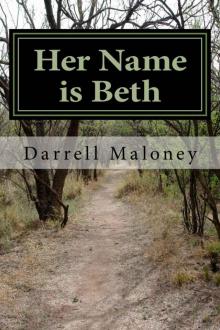 Her Name is Beth: Alone: Book 5
Her Name is Beth: Alone: Book 5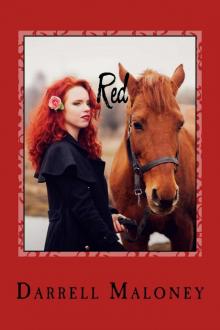 Red: The Adventure Begins
Red: The Adventure Begins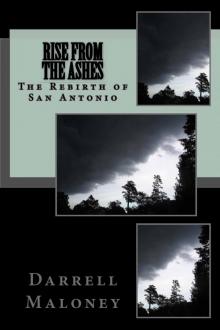 Rise From The Ashes: The Rebirth of San Antonio (Countdown to Armageddon Book 3)
Rise From The Ashes: The Rebirth of San Antonio (Countdown to Armageddon Book 3) An Unkind Winter (Alone Book 2)
An Unkind Winter (Alone Book 2)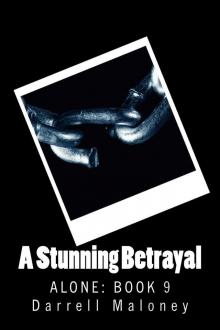 A Stunning Betrayal: Alone: Book 9
A Stunning Betrayal: Alone: Book 9 A Whole New World: Ranger: Book 2
A Whole New World: Ranger: Book 2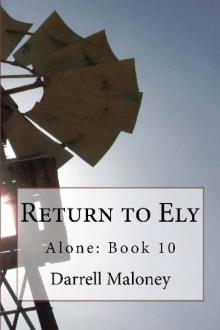 Return To Ely
Return To Ely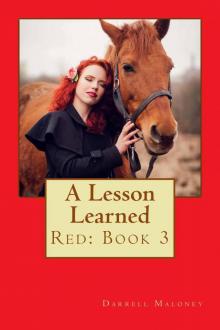 A Lesson Learned: Red: Book 3
A Lesson Learned: Red: Book 3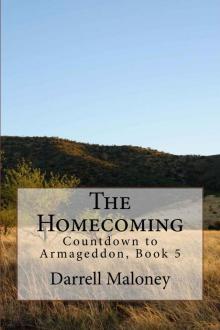 The Homecoming: Countdown to Armageddon: Book 5
The Homecoming: Countdown to Armageddon: Book 5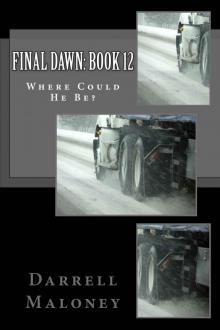 Final Dawn: Book 12: Where Could He Be?
Final Dawn: Book 12: Where Could He Be? An Acquired Taste
An Acquired Taste On Desert Sands: Alone: Book 6
On Desert Sands: Alone: Book 6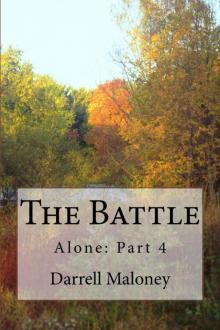 The Battle: Alone: Book 4
The Battle: Alone: Book 4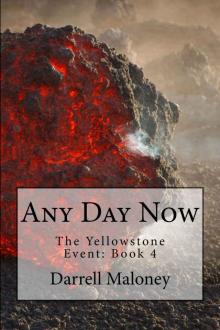 Any Day Now
Any Day Now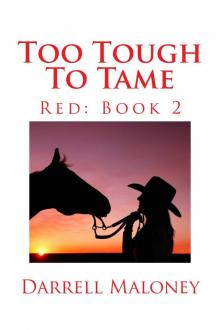 Too Tough To Tame: Red: Book 2
Too Tough To Tame: Red: Book 2 No Help From Austin: Red: Book 5
No Help From Austin: Red: Book 5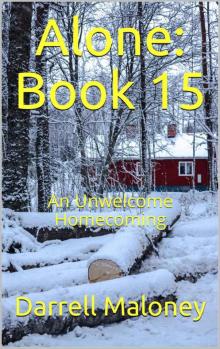 An Unwelcome Homecoming
An Unwelcome Homecoming A New Start: Final Dawn: Book 9 (Volume 9)
A New Start: Final Dawn: Book 9 (Volume 9)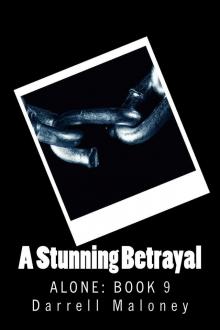 A Stunning Betrayal
A Stunning Betrayal An Undeclared War (Countdown to Armageddon Book 4)
An Undeclared War (Countdown to Armageddon Book 4) One of Our Own: Final Dawn: Book 11
One of Our Own: Final Dawn: Book 11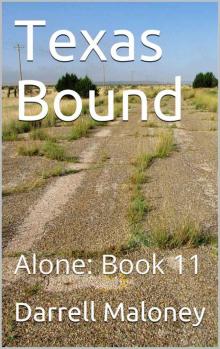 Texas Bound: Alone: Book 11
Texas Bound: Alone: Book 11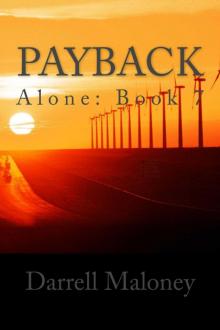 Payback: Alone: Book 7
Payback: Alone: Book 7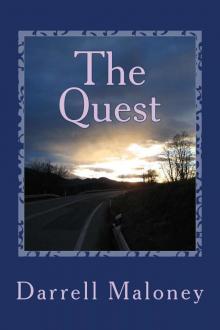 The Quest: Countdown to Armageddon: Book 6
The Quest: Countdown to Armageddon: Book 6 The Siege
The Siege The Yellowstone Event: Book 1: Fire in the Sky
The Yellowstone Event: Book 1: Fire in the Sky Return to Blanco (Red Book 4)
Return to Blanco (Red Book 4) The Search
The Search AFTER THE DUST SETTLED (Countdown to Armageddon Book 2)
AFTER THE DUST SETTLED (Countdown to Armageddon Book 2) Death Comes Calling (Ranger Book 3)
Death Comes Calling (Ranger Book 3)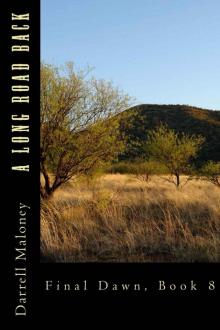 A Long Road Back: Final Dawn: Book 8
A Long Road Back: Final Dawn: Book 8